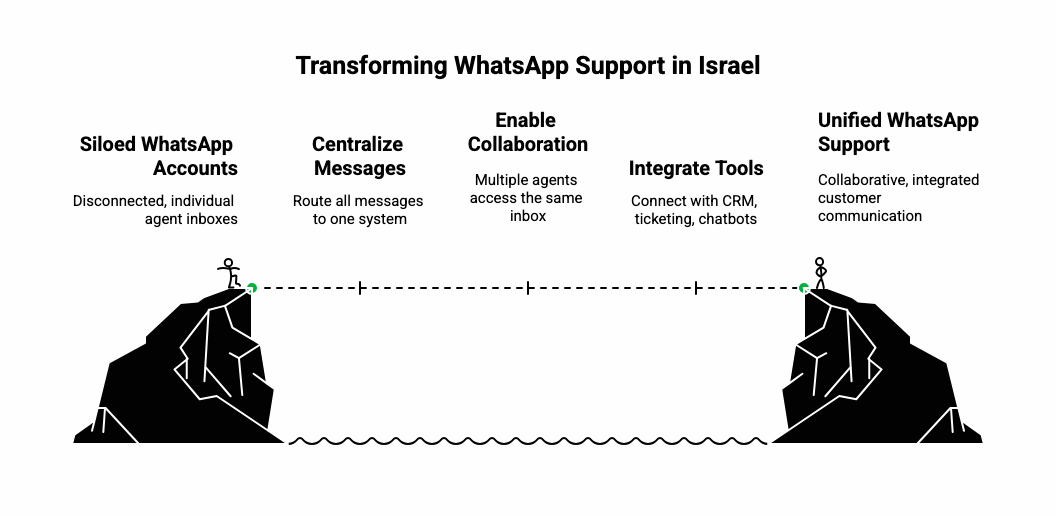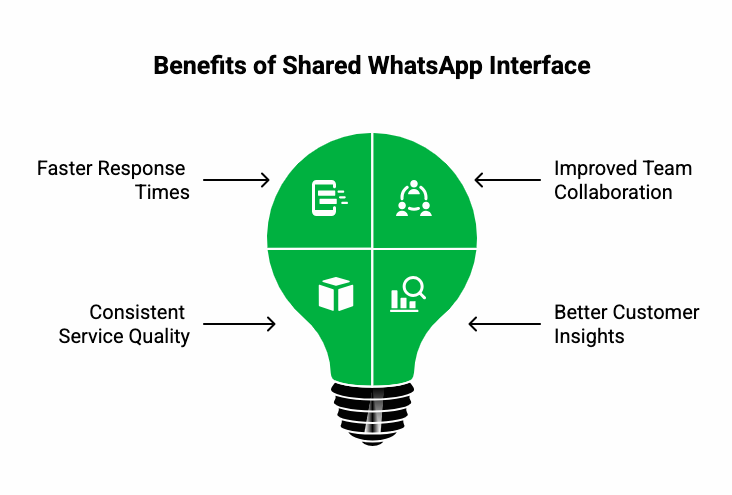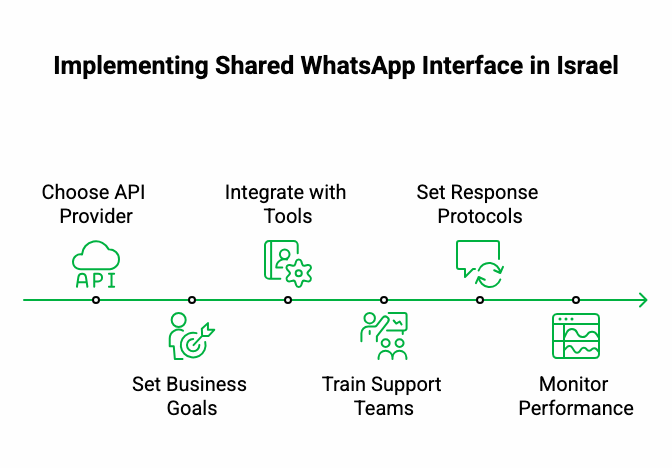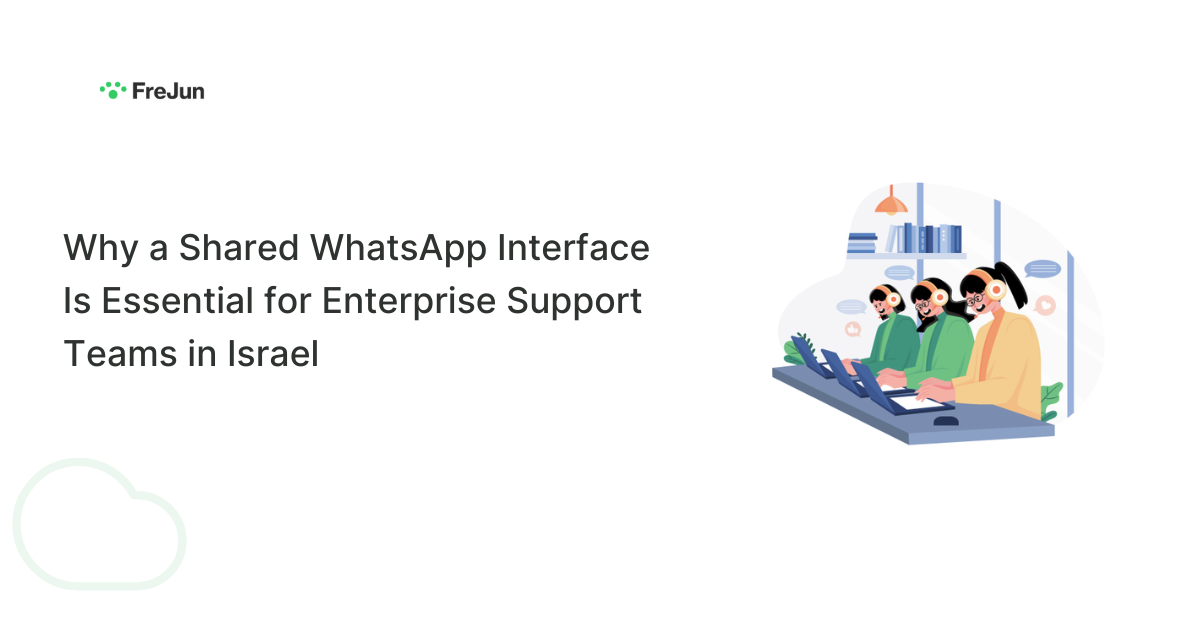In Israel’s rapidly evolving business environment, customer expectations are higher than ever. People expect fast, accurate, and friendly responses, no matter how many inquiries a business receives. For large-scale enterprises, this can be a major challenge, especially when customer conversations are spread across multiple agents and devices. That’s why the Shared WhatsApp interface in Israel has become an indispensable tool for modern enterprise support teams.
Table of contents
By using a centralized platform, multiple agents can access and respond to WhatsApp messages from a single dashboard, ensuring no customer query goes unanswered. This is more than just a convenience — it’s a transformation in how businesses handle support at scale, improving efficiency, response times, and customer satisfaction all at once.
Understanding the Shared WhatsApp Interface in Israel
The Shared WhatsApp interface in Israel refers to a collaborative workspace where all WhatsApp Business API messages are routed into a single system, accessible by multiple support team members. Instead of logging into individual devices, agents can reply to messages simultaneously, track customer histories, and ensure consistency in tone and service quality.

For Israeli enterprises, where industries like fintech, retail, and high-tech startups thrive, this is a game changer. These companies often face high inquiry volumes, especially during product launches, promotional campaigns, or service disruptions. With a shared interface, no single agent is overwhelmed — work is distributed evenly, and managers can monitor conversations in real time.
It also integrates seamlessly with other customer support tools such as CRMs, ticketing systems, and chatbots, enabling smooth automation and follow-ups. This ensures a unified customer view and prevents repetitive questions or duplicated responses.
Key Advantages of Using a Shared WhatsApp Interface in Israel
A Shared WhatsApp interface in Israel offers several distinct benefits that go beyond just sharing a login. It addresses specific challenges faced by large-scale support operations and adds measurable value to customer service performance.

1. Faster Response Times
Speed is critical in customer service. With multiple agents accessing the same inbox, messages are assigned automatically or picked up instantly, eliminating wait times. This is particularly useful during peak hours or emergencies, when customers need immediate answers.
2. Improved Team Collaboration
A shared interface fosters teamwork. Agents can leave internal notes, assign conversations to the right department, and escalate issues without customers having to repeat themselves. This results in smoother resolutions and happier customers.
3. Consistent Service Quality
By centralizing all messages, managers can monitor tone, check for compliance with brand guidelines, and ensure every customer gets the same high standard of service. This is especially important in regulated sectors like banking and healthcare in Israel.
4. Better Customer Insights
With conversation history and analytics in one place, support teams can spot recurring issues, identify high-value customers, and proactively address pain points. This data-driven approach helps enterprises improve products and services over time.
Why the Shared WhatsApp Interface Matters More in Israel
The Israeli market is unique in its tech-savvy customer base and fast-paced business culture. Consumers expect quick resolutions and personalized communication, and they won’t hesitate to switch brands if service falls short. In industries like fintech and cybersecurity, where trust is paramount, response delays or inconsistent communication can seriously damage reputation.

Additionally, many Israeli enterprises operate internationally, serving customers in multiple time zones. A Shared WhatsApp interface in Israel allows 24/7 coverage, with agents in different shifts or regions accessing the same platform without confusion.
Another factor is compliance. Israel has strict data privacy regulations, and a shared interface helps enterprises maintain secure, auditable records of customer interactions — something that’s much harder to do when conversations are scattered across personal devices.
How to Implement a Shared WhatsApp Interface in Israel
Adopting a Shared WhatsApp interface in Israel is more than just adding another tool to your tech stack — it’s a strategic decision that requires careful planning, integration, and training. This section will guide you through the step-by-step process, ensuring your enterprise is set up for long-term success.
By following these steps, Israeli enterprises in sectors like finance, retail, tech, and logistics can improve communication efficiency, enhance customer experience, and stay fully compliant with local and international regulations.

1. Choosing the Right WhatsApp Business API Provider
The first and most important decision is selecting a reliable WhatsApp Business API provider. Not all providers offer the same level of service, integration capabilities, or compliance support.
- In Israel’s enterprise market, leading solutions like FreJun are preferred because they provide local language support, secure hosting, and direct integration with CRM tools.
- Check that your provider offers multi-agent functionality, detailed analytics, and the ability to scale without service interruptions.
- Make sure they’re recognized as an official WhatsApp Business Solution Provider (BSP) to avoid compliance risks.
2. Setting Clear Business Goals
Before deploying, define exactly what you want to achieve with the shared interface:
- Do you need faster response times to meet SLA targets?
- Are you aiming for better collaboration between your support and sales teams?
- Is your priority data compliance and centralized reporting?
Having clear objectives will guide your configuration choices and help measure ROI later.
3. Integrating with Existing Support Tools
The real power of a Shared WhatsApp interface in Israel comes from integration.
- Link it with your CRM (like Salesforce or HubSpot) so every customer interaction is logged automatically.
- Connect with ticketing systems like Zendesk or Freshdesk to ensure messages become actionable support tasks.
- Sync with chatbots to handle FAQs instantly before routing complex queries to human agents.
By unifying these tools, you reduce the risk of missed messages and make every interaction part of a larger, trackable customer journey.
4. Training Your Support Teams
Technology is only as effective as the people using it.
- Conduct onboarding sessions to familiarize agents with the shared dashboard, tagging systems, and conversation assignment features.
- Train them on brand tone, escalation protocols, and privacy guidelines under Israel’s Protection of Privacy Law.
- Consider role-specific training for team leads so they can monitor metrics and coach team members.
5. Setting Response Protocols and Automation Rules
A shared interface works best when everyone follows the same playbook.
- Define response time goals for different types of queries (e.g., urgent, standard, informational).
- Use automation rules to route messages to the right department based on keywords or customer type.
- Implement canned responses for repetitive queries while keeping them personalized enough to feel human.
6. Monitoring Performance and Continuous Improvement
After launch, ongoing optimization is key:
- Track analytics like average response time, first contact resolution rate, and customer satisfaction scores.
- Gather feedback from agents to identify interface improvements or workflow bottlenecks.
- Use customer feedback to refine automation rules, FAQs, and escalation paths.
Read This and Others
- How to Deploy a Voice Bot AI Using Simple APIs – Step-by-step guide to building a production-ready voice bot with minimal code.
- Implementing a Voice Assistant Bot for SaaS Tools – How SaaS companies are integrating smart voice layers into their platforms.
- Build Scalable Voice Bot Solutions with APIs – Tactics for scaling voice bots using stateless architecture and modular APIs.
Key Takeaway
For enterprise support teams in Israel, adopting a Shared WhatsApp interface is not just about adding a new communication tool — it’s about transforming how teams collaborate, respond, and serve customers. By centralizing WhatsApp conversations into a single, organized workspace, businesses eliminate message silos, reduce missed queries, and speed up resolution times.
The benefits go beyond operational efficiency. A shared interface allows for consistent brand messaging, faster response times, and better workload distribution among agents. With integrated analytics, businesses can track performance in real time, ensuring support quality remains high while identifying areas for improvement.

In a competitive market like Israel’s, where customer expectations for instant, personalized communication are growing rapidly, enterprises that embrace this technology will have a clear advantage. It’s a strategic move that strengthens customer trust, improves retention, and positions the company as a responsive, reliable brand.
Simply put — if you want your support team to perform at its best, scale effectively, and deliver world-class service on a platform customers already love, a Shared WhatsApp interface in Israel is no longer optional — it’s essential.
Final Thoughts
For Israeli enterprises, adopting a Shared WhatsApp interface in Israel is not just a nice-to-have — it’s a critical investment in operational efficiency and customer satisfaction. In a market where speed, accuracy, and personalization are paramount, a shared interface ensures that every customer interaction is handled promptly and professionally.

It empowers support teams to work collaboratively, eliminates the risk of missed messages, and provides management with full visibility over customer conversations. The result is a more responsive, organized, and data-driven approach to customer service — one that matches the high expectations of Israel’s tech-forward consumers.
The bottom line: enterprises that embrace this technology will strengthen customer loyalty, reduce churn, and maintain a competitive edge in one of the world’s most dynamic business landscapes.
Further Readings – 15 Best Automated Calling Software for Indian Startups & Enterprises
FAQs
Yes, but most platforms allow you to assign conversations to prevent duplication.
Absolutely — when set up with WhatsApp Business API, messages are encrypted and access is controlled.
Yes, even smaller teams benefit from having a central hub for messages.
Yes, leading providers like FreJun offer seamless CRM integrations.
Pricing depends on your API provider, usage volume, and features needed
